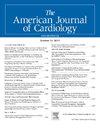Peripheral Venous Pressure-Guided Decongestive Therapy in Heart Failure 2 (PERIPHERAL-HF2)
IF 2.3
3区 医学
Q2 CARDIAC & CARDIOVASCULAR SYSTEMS
引用次数: 0
Abstract
Congestive symptoms are the primary cause of hospitalizations in heart failure (HF), and diuretics remain the cornerstone of their management. However, clinical practice varies widely due to a lack of a reliable measure of congestion guiding diuretic use. Consequently, many HF patients are discharged prematurely without adequate decongestion, leading to increased readmissions and mortality. Peripheral venous pressure (PVP) has emerged as a promising noninvasive measure of vascular congestion. This study will enroll 650 patients aged 18-99 years admitted with de novo or acutely decompensated chronic HF. In the standard care arm, diuretic dosing and discharge decisions will be at the physician's discretion. In the PVP-guided arm, the goal is to maintain a PVP of <9 mmHg, with diuretic dosing adjusted based on daily PVP changes and urine output. The primary outcome is a composite of all-cause mortality, hospitalizations, and emergency department visits, with secondary outcomes including cardiovascular mortality and HF-related readmissions. We hypothesize that PVP-guided diuretic therapy will provide more precise and effective decongestion than standard care, reducing rehospitalizations and mortality. In conclusion, this study will offer valuable insights into the relationship between diuretic therapy, vascular congestion, and cardiac and renal outcomes.
Trial registration: ClinicalTrials.gov Identifier: NCT06495892
求助全文
约1分钟内获得全文
求助全文
来源期刊

American Journal of Cardiology
医学-心血管系统
CiteScore
4.00
自引率
3.60%
发文量
698
审稿时长
33 days
期刊介绍:
Published 24 times a year, The American Journal of Cardiology® is an independent journal designed for cardiovascular disease specialists and internists with a subspecialty in cardiology throughout the world. AJC is an independent, scientific, peer-reviewed journal of original articles that focus on the practical, clinical approach to the diagnosis and treatment of cardiovascular disease. AJC has one of the fastest acceptance to publication times in Cardiology. Features report on systemic hypertension, methodology, drugs, pacing, arrhythmia, preventive cardiology, congestive heart failure, valvular heart disease, congenital heart disease, and cardiomyopathy. Also included are editorials, readers'' comments, and symposia.
 求助内容:
求助内容: 应助结果提醒方式:
应助结果提醒方式:


